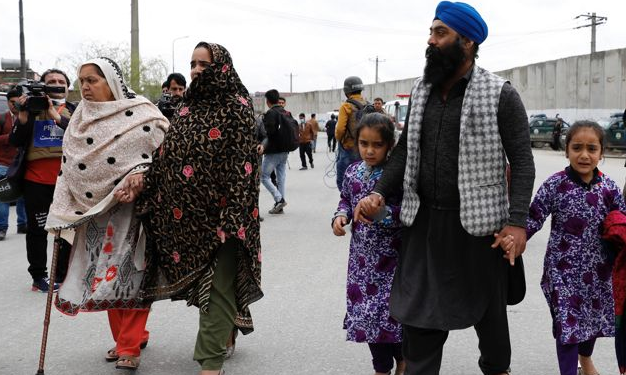New Delhi: Baldeep Singh, an Afghan Sikh, who fled to India after Afghanistan fell to the Taliban, knows three languages, including Hindi and French, but has been having a hard time finding a job to feed his family.
This is the case not only with Sikhs who arrived in the midst of the fall of Kabul to the Taliban August 15, but also those who left the country before, said the 24-year-old, who is at present living in New Mahavir Nagar.
The Taliban swept across Afghanistan last month, seizing control of almost all key towns and cities in the backdrop of withdrawal of the US forces that began on May 1. It took over Kabul on August 15 and unveiled a hardline interim government.
This is not the first time that Baldeep Singh has left Afghanistan.
March 25 last year, his mother was killed in a terrorist attack while she was outside their room at Kabul’s Guru Har Rai Sahib Gurdwara. In May that year, Baldeep Singh left for India, fearing for his and his family’s safety.
However, a few months later, he returned to Kabul. “That is the place I was born. That is the place where my mother died. How could I be somewhere else,” he said.
But the Taliban’s takeover of Afghanistan meant, Baldeep Singh had to flee Kabul again, and this time he does not know if he will ever be able to go back.
Looking at his mother’s photo on his mobile phone, he said, “She went downstairs to offer prayers and was killed in a terrorist attack. Around 25 people had died.”
The family, including his father, grandmother, two brothers and uncle, had fled Afghanistan in May last year. “The attack had shaken us,” he said.
On the current situation in the country, Baldeep Singh said, “It is turning worse every day. Yesterday, the Talibs abducted a Sikh at gunpoint.”
His maternal uncle, Raj Singh, who had left Afghanistan three years ago, says around 300 people, including Sikhs, are still stuck in Kabul, Ghazni and Jalalabad, and are desperate to leave the country.
“Didn’t you see the videos, they are butchering people, riddling them with bullets. What else do you expect,” he said when asked about the situation in the war-torn country a month after Kabul fell to the Taliban.
Around 73 Afghan Sikhs came to India since then. A few families have left for Punjab where they have relatives. The ones in Delhi depend on the help from Gurdwara Guru Arjan Dev in New Mahavir Nagar.
At least six such families have been living in the gurdwara since they completed their mandatory quarantine period at the ITBP facility in Chhawla area.
The Sobti Foundation of New York-based philanthropist Mandeep Singh Sobti has come forward to adopt them.
Kanv Bhalla, an entrepreneur coordinating rehabilitation efforts on behalf of the foundation, said these families are being shifted to rented accommodations and eligible persons will be given jobs according to their skills.
However, Raj Singh said it is difficult for displaced Sikh families to find their feet in India without citizenship.
“We struggle to get a sim card or cooking gas cylinder. Even if we go to hospital, they ask for Aadhaar card. We have no value without an Indian identity card. We cannot travel outside Delhi like others do,” he rued.
He said most of the Sikh refugee families, who had come to India earlier, have been living hand to mouth.
Baldeep Singh said he started selling mobile covers a few months ago, but the lockdown rendered him without work last year.
“I can do anything. I am a quick learner. I can work at an apparel store or drive a car, you tell me,” he said.
Amarjit Singh, 45, was among the 49 Afghani Sikhs who flew into Delhi from Kabul via Dushanbe on an Air India flight last month.
He has been putting up at the gurdwara along with his wife and five children, one of them aged three months.
“The Taliban doesn’t care for its own people, forget about Sikhs. You have no idea what these people are going through,” he said. Amarjit Singh, who owned a grocery shop in Kabul, said he is ready to polish shoes if that gives him enough money to feed his children.
“I am not ashamed of selling potatoes and onions. I have to feed my children. There is no shame in honest work,” he said.
Kirpal Singh, who sold medicinal herbs in Kabul, came to India empty handed. “I did not get any time to pack a pair of clothes.”
“I had a good earning there. Here, I may not have anything but I am alive. I will do whatever work I get. The priority is survival,” the father of three children said.
An intelligence officer who fled Afghanistan days before the Taliban stormed Kabul, admits life as a refugee has been harder than he thought.
“My family is still stuck in the country. And here I have no one of my own. I had planned to start a business in India but that’s easier said than done,” he said.
PTI







































